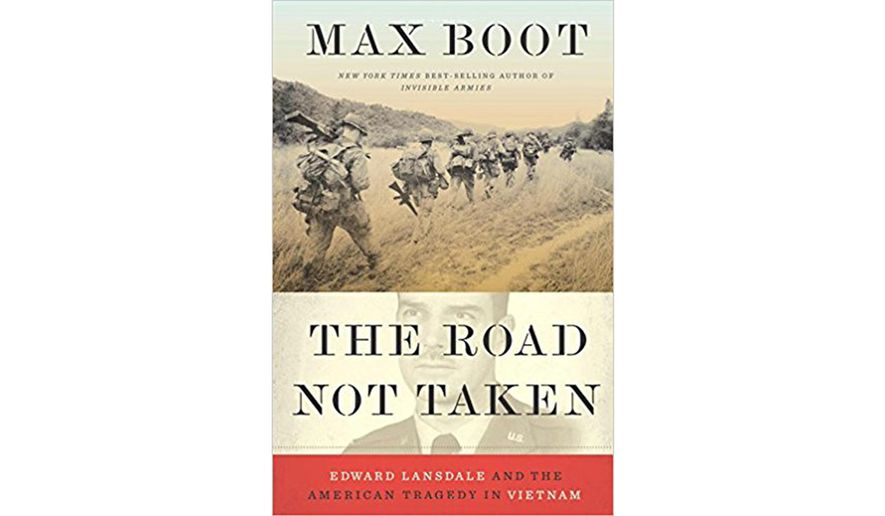OPINION:
THE ROAD NOT TAKEN: EDWARD LANSDALE AND THE AMERICAN TRAGEDY IN VIETNAM
By Max Boot
Liveright, $35, 768 pages
Edward Lansdale is probably the greatest cold warrior that most Americans have never heard of. Max Boot has written a fascinating account of how this California college humorist, frat boy and advertising executive evolved into a counterinsurgency expert before the term was even coined. He was a virtual shadow American proconsul in both the Philippines and South Vietnam in the 1950s wisely advising both Philippine President Ramon Magsaysay and South Vietnamese leader No Dinh Diem on how to deal with Communist inspired insurgencies.
His success in the Philippines was spectacular and made his reputation. In Vietnam he was originally successful, but saw his influence wane for reasons beyond his control. However, he became the father of today’s American counterinsurgency doctrine even though few American advisers have been able to replicate his skill in influencing foreign leaders.
Max Boot has become one of the master chroniclers of American counterinsurgency efforts, and his biography of Mr. Lansdale is a tribute to a guy who recognized the threat of insurgency in a post-World War II environment where most American leaders saw only brute force as a solution to any political-military problem.
Although he never admitted it publicly until late in his life, Mr. Lansdale was a CIA agent with a cover as an Air Force advisory officer. In the Philippines of the early 1950s he became a personal adviser to the Philippine defense minister — and later president — Magsaysay in putting down the Communist inspired Huk rebellion by convincing Mr. Magsaysay that the key was not just killing insurgents, which only created more insurgents.
Mr. Lansdale argued that success was dependent on getting the people to stop supporting the insurgents, and have some hope that the government was a better alternative. Eliminating insurgents militarily was only a secondary part of the Lansdale approach. It worked in the Philippines because Mr. Lansdale developed a unique brand of trust with that nation’s leader.
When he was asked to do the same things in South Vietnam, Mr. Lansdale was initially successful in developing a personal rapport with Prime Minister Diem. However, Mr. Lansdale eventually lost influence with Mr. Diem due to the machinations of Mr. Diem’s brother No Diem Nhu and his manipulative wife Madam Nhu. Absent Mr. Lansdale, the Kennedy administration eventually lost confidence, and authorized a military coup that resulted in the death of both of Diem and his brother leading to a series of disastrous military juntas.
Mr. Boot also points out that the differences in culture and language worked against Lansdale in Vietnam — he never developed a facility for foreign languages — but he was still able to develop a close personal relationship with Diem. Unlike the island archipelago of the Philippines, South Vietnam’s insurgents had sanctuary in North Vietnam and China that would prove fatal to the south in the end.
Mr. Lansdale had a dislike for bureaucracy that would hamper his effectiveness for life. He became somewhat publicly recognized — falsely — as one of the protagonists in Graham Greene’s novel “The Quiet American,” and more accurately as a lead character in “The Ugly American” written by a Lansdale associate.
Mr. Lansdale eventually became an Air Force major general and Pentagon official; but he was never able to replicate the success inside the Washington Beltway accomplished in Asia, and he watched the American tragedy in Vietnam unfold despite several attempts to change policy on trips to Saigon before it fell to the Communists.
Mr. Lansdale was not a perfect human being. He had a long-term love affair with a Philippine mistress; but he stayed married, wedding the mistress only after the death of his wife. Mr. Lansdale’s ability to develop personal relationships with foreign leaders and guide their policy-making has never been fully replicated by his modern American adviser successors in fighting insurgencies in Iraq and Afghanistan.
His philosophy of attempting to separate the civilian population from the insurgents has now been codified in U.S. counterinsurgency doctrine. He was a firm believer that American constitutional democracy was far superior to the kind of authoritarianism that the Communists offered and believed that local forces, not Americans, should lead the fight.
American counterinsurgency doctrine as outlined by Mr. Lansdale is sound in that it desires host nation governments to try to convince its people that it is a better option than communist or Islamic fundamentalist alternatives. Unfortunately, getting the locals to buy off on the concept is difficult indeed. Mr. Lansdale succeeded with Mr. Magsaysay, but ultimately failed with Mr. Diem. This book should be read in Baghdad and Kabul, not only by Americans, but by local leaders.
• Gary Anderson is a retired Marine Corps colonel who served as a civilian adviser in Iraq and Afghanistan.




Please read our comment policy before commenting.